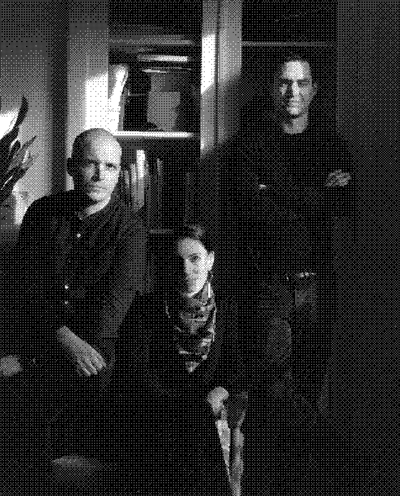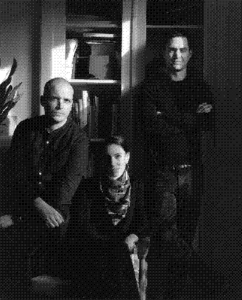References Development Strategy Advice Management Prospective Creativity Clients Communication Process Prospection Work culture Competition Presentation Design Typography Agents Advertising Ai Finance Architecture Investment Education Cgi Trend Fashion Recruitment Graphic design Nft Music Marketing Photography Sound design Research Blockchain Sustainability Crypto Technology Metaverse
26 excerpts on the topic “Work culture”
[…] Yeah, we’re definitely Internet kids. […]
[…] But there’s this extreme crazy level of trust in which not every idea has to come from a strategist or a creative director or a designer. Good ideas can come from anybody. And especially as we’ve maintained that level of trust amongst the four of us, one thing that we’ve noticed is that if somebody on our team really believes in an idea and feels it can push the needle for us, then the other three people most of the time do whatever they can to help make that idea come to life. […]
[…] We’re intentionally small so that we are able to continue being part of the work. We’re makers by nature. We’re small so that we can keep the culture, so that everyone on our team can reach us. When you get too big, you can’t do that. And you lose that innovative spirit. […]
[…] To be frank, partnering professionally with your spouse is something I wouldn’t recommend. It’s challenging. Looking back, I see distinct phases in our partnership. […]
[…] At 43, both Sara and I must consider our relevance in the visual field. While some designers remain influential into their 50s, others do not, and it’s not always graceful. I aim to maintain relevance not just visually but by adding value through our experience and knowledge of the process.
Working with a younger team, often under thirty, presents a generational gap—sometimes up to 18 years between myself and other team members—which can be stimulating. […]
Working with a younger team, often under thirty, presents a generational gap—sometimes up to 18 years between myself and other team members—which can be stimulating. […]
[…] They don’t teach you a lot of things at school. You come out and you’re trying to understand the real world, learning by doing. And so I learn every day. I’m continually learning how to do it and how to manage. How to be very well balanced while also trying to make everyone happy. We’re all working in a very nice space in a very nice house, but it’s not only about the space; the ambience and the feeling are essential. […]
[…] Also, being positive is super interesting. Today we’re in a kind of world that royally pisses me off, where you have to show people you’re tired. […]
[…] SE
That’s part of open-sourcing. Showing it. Don’t be secretive. I think those times are over. Not saying that you should reveal every secret, but you should give the information or knowledge away for free and not expect anything back. You get it back anyway. […]
That’s part of open-sourcing. Showing it. Don’t be secretive. I think those times are over. Not saying that you should reveal every secret, but you should give the information or knowledge away for free and not expect anything back. You get it back anyway. […]
[…] AR
We spoke about hiring another small team within international magic, so yeah. I think around about 8 to 12 is a good number. Otherwise, it becomes unmanageable and you spend a lot of time managing people […]
We spoke about hiring another small team within international magic, so yeah. I think around about 8 to 12 is a good number. Otherwise, it becomes unmanageable and you spend a lot of time managing people […]
[…] SE
We tend to slowly grow. Very slowly. We want to have intensive relationships with our people and team because we spend so much time with them. I spend more time with my team than with my family, almost, during the day, so for me it’s really about just the team and getting the right people. I don’t want to grow fast. I want, in terms of business, to grow successfully over time. Step-by-step. Maybe in three years’ time we will want to be larger or not, but for now I think the team size is great. […]
We tend to slowly grow. Very slowly. We want to have intensive relationships with our people and team because we spend so much time with them. I spend more time with my team than with my family, almost, during the day, so for me it’s really about just the team and getting the right people. I don’t want to grow fast. I want, in terms of business, to grow successfully over time. Step-by-step. Maybe in three years’ time we will want to be larger or not, but for now I think the team size is great. […]
[…] Around 2015, we had the epiphany — that sounds like a grand statement but it’s true — that culture is not limited to visual arts. Brands, events, music and fashion, play an integral, and sometimes greater role, in shaping the culture. We also realised that we could facilitate opportunities for brands to support culture (…) Our focus has expanded from Culture with a capital “C” to “culture” with a lowercase “c.” It then became a deliberate choice to expand who and how we work, even if what we do is the same. […]
[…] I was more attracted to the process and way of thinking in contemporary art than the finished works of architecture and interior design, and usually found myself leaning toward conceptual direction. While attending school I did solo exhibitions of art and, even after graduating, I worked on design while studying under critics of contemporary art and architecture. […]
[…] I believe that God (or nature, per Shintoism) dwells in the details, so no matter how big the project, I need time and collaboration to think about the details. It doesn’t really matter how big or small the project is, as long as you can think about the details. […]
[…] I will put together a big idea, decide the policy, and always discuss with the art director, the project manager, and the interior designer to make a concrete plan. They share the idea with the studio, so they are as creative as the consensus of the office. […]
[…] When I finish something I already know what I’m going to do next. Which is something I learned from my farmer parents. My uncle always used to say: “Once one job is finished you should already know what the next one is going to be.” This helps you move forward, be efficient, produce. I never lost that state of mind. So I’m never inactive. I have loads of defects, but that right there is my quality. […]
[…] DL
we believe that you can only create things when you feel safe, not afraid to get judged on the mistakes you make. So we give people a lot of freedom. There’s not so much control. There is the freedom to shape your own part. Often you see that the way people evolve also defines the way the studio’s direction evolves. […]
we believe that you can only create things when you feel safe, not afraid to get judged on the mistakes you make. So we give people a lot of freedom. There’s not so much control. There is the freedom to shape your own part. Often you see that the way people evolve also defines the way the studio’s direction evolves. […]
[…] the studio which is very collaborative, a laboratory of thinkers with constant dialogue between everyone, in between the departments, the art directors, the creative directors, the designers, the architects, Willo, myself … […]
[…] You need to be able to pivot… […]
[…] we have many verticals, we have interiors & architecture, design & art direction, and then also, project managers, studio managers… […]
[…] We really try to push this idea of not thinking as an individual, but thinking as a whole. We try to all sit in one room, on one table, and everyone is there with their laptops, so it keeps distances very short. Everybody can help each other out, as well […]
[…] So it’s a very German discussion, you can tell: we talk about security, being safe for the next years as an office and a team. […]
[…] I would say so, the Dumbar culture is also a team culture. Everybody says “family”, of course when you spend so much time with someone, it becomes family because it’s the people you end up seeing the most. But it’s really a working-together culture. We like to experiment, to challenge each other, in a positive way. […]
[…] It has to do with the geography and history of the country. It’s a flat country, the land was reclaimed and in order to create something like this, you have to learn to work together, you cannot have your own kingdoms. You have to work with your neighbours, to look at the interest of your neighbours and bring them together with your own interest to create good results. That way of thinking is ingrained in the Dutch culture and its design. […]
[…] What unites us is the love of the work we have and the will to work together. We admire each other’s skills and we enjoy working together. It’s the love of work that makes us a team. Having a sense of humour, not taking things to heavily is also very important. We can make jokes about our work and tell each other it’s shit. (laugh) Humour is essential. […]
[…] (LA) We have been living for seven years in this place, which is a studio connected to the house. Before that we use to have a studio in the city and live in North Amsterdam, across the river, so we had to travel up and down. But our dream had always been to have this together as we feel work and life is one thing. You do shut the door sometimes but there’s always something keeping going. It also allows us to show our kids how we work, what we do. And it was practically better to work at the house. […]
[…] That’s also the reason our office doesn’t really work with freelancers: we have an ideology; we like to develop a language that is our own… it’s not for the world. It’s for people who work here. It’s not like we have a freelancer and I tell him ‘hey dude, we should do this, this and this’ and then we don’t do the idea and then he goes to his next client and regurgitate my idea. That’s why we don’t work with freelancers. […]

